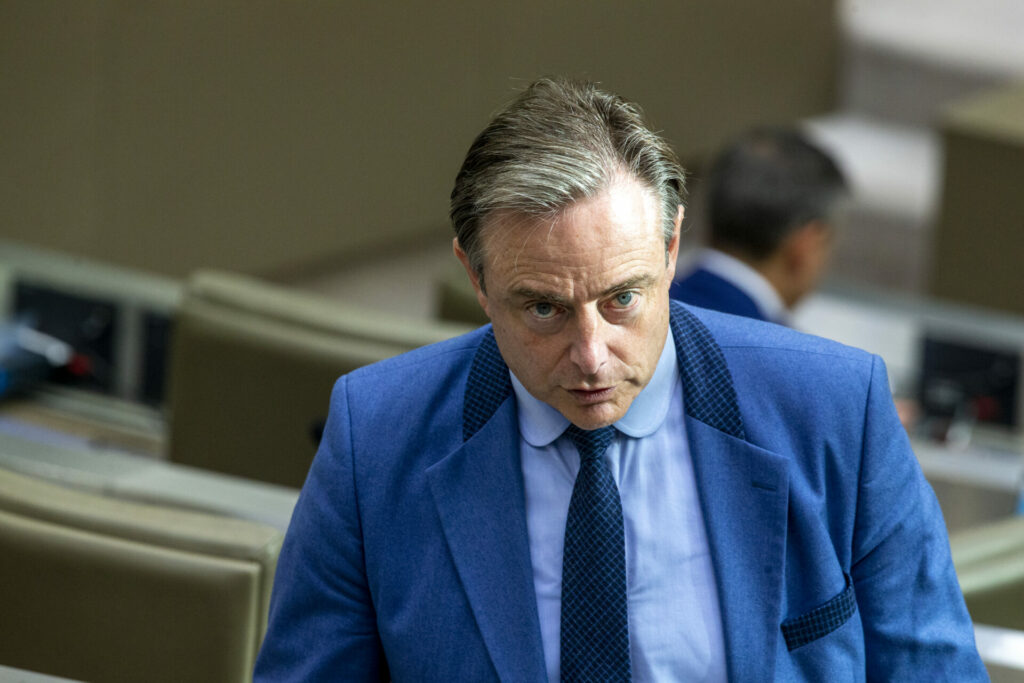The agreement reached by the Federal Government with energy operator Engie to keep Belgium's two youngest nuclear power plants – Doel 4 and Tihange 3 – open longer is not a real agreement but rather a "Trojan horse," claims Bart De Wever, the leader of the rightwing Flemish separatist's party N-VA.
Several weeks later than planned, Prime Minister Alexander De Croo and Federal Energy Minister Tinne Van der Straeten announced an agreement with Engie on preparing to keep nuclear reactors Doel 4 and Tihange 3 open for ten years longer, starting in the winter of 2026.
"We had to make this deal to meet the winter of 2026-2027. The most important thing today is to start the works so that we can achieve that," said Egbert Lachaert, the leader of the Flemish liberal Open VLD party (of which De Croo is also a member) on VRT's 'Terzake' television programme. "And the second milestone is that the Belgian government and citizens are again partly at the wheel of the nuclear power plants."
However, De Wever – whose party is in the federal opposition – disagrees because while a timetable was worked out and Belgium agreed to enter into a partnership together with Engie (50% each), there is no clarity on the cost of decommissioning and disposal of the nuclear waste.
Trojan horse with a giant bill inside
"Would you participate with me in a company knowing that there is a huge bill attached, but that I will not yet tell you what it is? You are already agreeing to buy 50% of my shares and you are going to pay billions for it, but you do not know how many because that has yet to be negotiated," De Wever said. "Then there is actually no agreement. And no works are starting yet either. Studies on works are starting."
When he questioned whether Engie had actually signed anything yet, Lachaert clarified that the document was prepared on Monday during the negotiations. "You also know that making such a text with a multinational and the government is complex. In the end, something will be signed. But of course, there are still parts to clear out."
Still, Lachaert stressed that there is more clarity than De Wever says. "The cost of decommissioning the nuclear plants will remain with Engie. We are still going to have to make agreements about that nuclear waste. In many other countries, nuclear operators have agreed on a kind of maximum cost for the operator with governments. That will now be calculated."
Tweet translation: "Engie is starting works now, to land in 2026. Unless an atomic bomb falls on Antwerp or some other disaster happens, Engie must provide an extension for winter 2026-2027."
For De Wever, however, this "comes across as a kind of Trojan horse with a giant bill hidden inside," he said. "The horse is rolled in, but the guarantees are not there: no nuclear fuel is ordered and there is no signed agreement. The negotiations on the cost price will now happen with a knife at the throat. None of this inspires much confidence."
He also said that with this agreement, there is no security of supply at all. "A report by Elia was presented in the Chamber last month that calculates the shortage of electricity we will have. In the winter of 2024-2025, Elia says there will be half a gigawatt shortfall. That might still be manageable, but in the winter of 2025-2026, the shortfall will be 3.6 gigawatts. That is huge. Even if Doel 4 and Tihange 3 stay open, we will still be 1.8 gigawatts short."
Related News
- 'Works can start tomorrow': Belgium and Engie reach deal to extend nuclear power plants
- Elia presents recommendations to prevent blackouts
- Tihange 2 nuclear power plant to definitely shut down on 31 January
Lachaert remained optimistic, saying that the job of the parties in the opposition is to raise issues, and it is the job of those governing to solve them, step by step. "Extending the latest nuclear power plants is a very important step. We are doing it now, so we can only be positive about that. But that does not yet solve all our problems."
He did admit that there will be a supply shortfall in the winter of 2025-2026, but that Monday's agreement means that will no longer be a problem in the winter of 2027. "We are now letting Elia calculate exactly how big that shortfall is and then we can see how we solve it."
"I know there are requests for additional tendering of gas and there is also the possibility of whether or not to extend the oldest nuclear reactors for another winter, as has been done in Germany," Lachaert said. "Within the Federal Government, we will look at this with an open mind. We will solve the problems, point by point."

